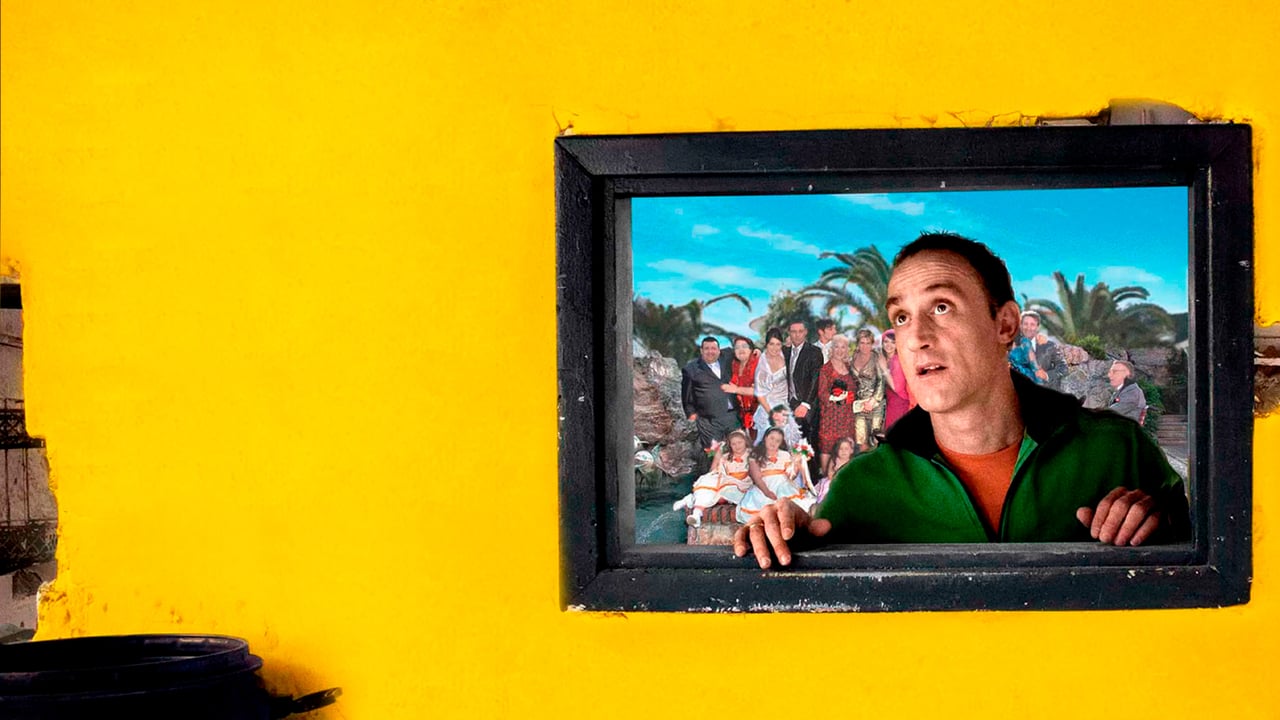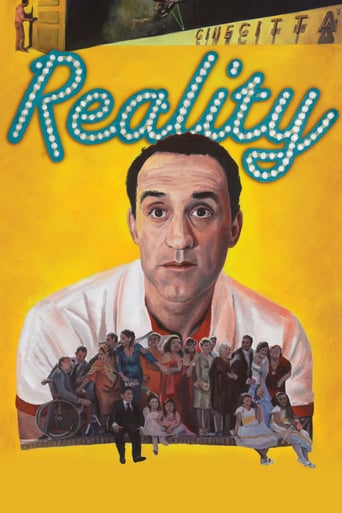

When I started watching this movie I thought "Well, the director is Garrone and the movie is set in Naples, so it must be a copy of Gomorrah or something like that". Instead I was surprised of how Garrone nicely brought up another aspect of Naples and its inhabitants. The setting is a poor neighborhood in the Italian port city and the main character is Luciano, a fishmonger and father of two children. His daily life is ordinary and uneventful and he struggles to earn money through his first job and his second one which consists in cheating people by selling them some cleaning devices. Everything could change when he has the opportunity to participate to the Big Brother rehearsals where he can exploit his qualities as entertainer. His certainty of making it to the show is so strong that he becomes paranoid about people of the Big Brother casting staff spying on him to see if he's really a character as he claims to be in everyday life. He does many crazy things like selling his fishmonger activity and doling out his personal belongings to poor people in order to impress the alleged casting personnel following him. His mental condition soon worsens and develops into craziness which of course affects inevitably his family life. What I liked best about this movie is how Garrone underlines how miserable everyday life can be and how everyone is in search of the big opportunity to get out of misery. This however can lead to ruining personal and family life. I also appreciated how the director shows how some feelings and actions can be so evidently false as that of Luciano of being overly generous with poor people only for personal purposes. One last thing I would like to mark is Garrone's style of shooting, which was quite like that of Gomorrah, that's very simple and with seemingly amateur close shootings. Compared to Gomorrah however I would say that he wanted to give a more dreamy touch and also something Fellinesque: in one scene Luciano comes back home from the Big Brother rehearsal in Rome and, in the beautifully lit neighborhood, he's welcomed by his neighbors as a hero. In the next scene the neighborhood is showed in daytime during its normal daily activity, presenting all its simplicity and misery. Therefore an evident contrast is shown between dream and reality.
... View MoreLuciano owns a booth in the fish market in Naples and rounds his revenues with a suspect scheme of phony kitchen robots ordering and re-selling. He has a typically assertive Italian wife, three typically sticky and noisy Italian kids and a bunch of family and neighbors which are as typical as Fellini characters can be. His lodging in the decrypt area of Naples is kind of a set of the 'Leopard' abandoned for 150 years. His contact with the big world are the reality shows, his only apparent chance of breaking the walls of his limited life is getting on the set of the 'Big Brother' show. A dream which he will eventually achieve at the cost of his own sanity.Aniello Arena is the name of the actor who plays Luciano and he does a fine job describing the descent of the character into insanity, his increasing obsession that all his life has become a reality show. Do you remember Truman Show starring Jim Carrey? The hero there thought that he was living a normal life and in reality all was a TV show. Here it's quite the opposite. Director Matteo Garrone does a fine cinematography job, and his sets look at many moments like descending from Fellini or Visconti. The ending may ask some questions about reality, but actually we have descended into the i-reality of such shows. I liked it.
... View More** Contains Major Spoilers, including a discussion of the ending of the film** When asked about what he was trying to say with Faust, Goethe replied that what he wanted to say was what's he'd written in the play. If he'd wanted to say something else, he added, he would have written something else.Matteo Garrone, of Gomorrah fame, is going for much the same answer about his latest work, Reality. I just saw the movie and the director himself at the 2012 Toronto International Film Festival, where Garrone stepped on stage after the screening to take a few questions.It was an entertaining back-and-forth between an audience gushing with praise and a visibly pleased but disarmingly unpretentious director. When asked to elaborate on the film's enigmatic ending, though, Garrone politely declined, saying that he'd rather leave it open to interpretation, and was more interested in what the audience thought.So, here's my take. At the end of the movie, the main character Luciano, a Neapolitan fishmonger who auditioned for Grande Fratello (Italy's Big Brother) but never heard back, sneaks onto the set of the show in Cinecitta. None of the Big Brother contestants, who are splashing around in the pool, seem to notice him. Luciano, seemingly mesmerized by the giggling bunch, takes a seat on a sunbed in a courtyard nearby—and suddenly he can't stop laughing. The final shot zooms out, beginning with Luciano giggling all by himself and eventually encompassing all of Rome.What does the uncontrollable giggle mean? Has Luciano lost his mind? That's a very real possibility. On the other hand, as Garrone pointed out to me when chatted briefly after the screening, he also may be laughing because he's finally won—after all, he is finally in "The House." But what kind of victory is that? I think we're supposed to compare the final scene with the first. The film opens with a panoramic shot of Naples in full daylight with Vesuvius and the Bay as a backdrop. Then the camera slowly zooms in on the odd spectacle of a gilded horse-drawn carriage. The carriage arrives at a sort of villa, where a staff dressed in what appears to be 18th century costumes opens to door for the passengers, a tacky bride and groom.Both the opening and closing scenes revolve around some kind of fantasy, but one zooms in while the other zooms out. The colors are important here. The opening shots are strikingly colorful and bright, while the final shot is almost black and white, being shot at night and starting from the minimalist courtyard with its stylized white-backlit lounge chairs. The opening is crowded with family and friends, and in the end, Luciano is alone. The opening represents fantasy within the bounds of reality, while reality TV is fantasy beyond these boundaries.By the end of the movie, Luciano has lost sight of what is most important: his family. It is true that his life as a fishmonger and scam artist is far from idyllic, but there is undoubtedly something valuable in the role he plays in his own small community. He is already a star to his relatives and friends, as we see from his comic performance at a family wedding at the beginning of the movie.see the rest of this: americanfilmtheory.com
... View MoreI'm not afraid to admit that I actually prefer this film to Garrone's previous characters-melange crime-drama GOMORRAH (2008, a 7/10), albeit both won Cannes's Grand Prize of the Jury in their respective years. I watched the film in KVIFF a few days ago, and I am thrilling to see that there is a change of attitude in detailing a riveting story of Naples people's mundane life, about a reality-show sparks a never-be-quenched yearning of a Naples fishmonger's pipe dream of becoming a reality-star, which turns him paranoid about his surroundings and mars his and his family's life, and all winds up in an ambiguous ending.REALITY has a drastic alternation in its visual impetus, a Fellini-esque Napoli milieu (with the mammoth structure of kins under a dilapidated tableaux), which could instantly gain some positive impression from the film's opening sequence, which induces a tremendously lush wedding ceremony. A comical tone has never ceased to hover around the typical but accurate portrayal of the workaday life of our protagonist and his family (a hanky-panky retail business of pasta-making robots is the highlight) until the latter part when everyone on screen and offscreen realize the one-sided opportunity will never arrive except for our leading man in the film, so literally how miserable his ending would be has grown into the main concern hanging the film's weight. And there would be a great chance it would plunge into an irreversible maw of tragedy, but luckily it doesn't, Garrone alters a lightly grotesque route and resorts to a more theatrical maneuver to leave the finale in a spell bound shot, effectively ridicules and bashes the reality-show oriented credo in the present-time. The gorgeous score from extraordinarily talented composer Alexandre Desplat is another selling point, seamlessly goes with the plot, and thwarts a likely bathos when the soothing comedic temper is steadily mitigated and the film veers to a suspicious restlessness and ultimately the irrational madness. The cast is plainly spot-on in spite of Aniello Arena's over-handsome and beefcake image as a fishmonger, Raffaele Ferrante's rendering of a reality-star who originally rose from the mass, is both hilarious and sarcastic in stressing the ill-infused celebrity-rules notion, which is indubitably not the only entrance to fame and fortune for those wide-eyed dreamers.
... View More